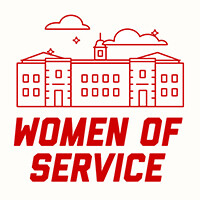
Editor’s Note — This is part of a Women’s History Month series featuring women who make a positive impact on the campus community through their work as office/service employees. The Women of Service series is organized by the Chancellor’s Commission on the Status of Women. Stories will run every Monday, Wednesday and Friday in Nebraska Today through March 30.
When the University of Nebraska–Lincoln pivoted in response to COVID-19, Julie Koch was among dozens of Huskers who stepped up to accept new roles and responsibilities, helping to keep the institution moving forward.

A member of the Passport Office when the university shifted to remote instruction/work in spring 2020, Koch initially assisted with business operations and helped organize and fill COVID-19 wellness supply orders made via UNL Marketplace. Her role expanded greatly in spring 2021 as she agreed to help launch and operate the university’s Wellness Attendants program.
“I was just back on campus after the shutdown and received this emergency email to call my supervisor about something,” Koch said. “I jumped on a Zoom call and he told me about this Wellness Attendants program. They needed someone to help organize it and he wondered if I would be willing.
“From there, the ball just kept rolling forward.”
Offered during two semesters — spring and fall 2021 — the Wellness Attendants program stationed a small army of student workers at building doors across City and East campuses. The attendants were tasked with verifying (via the Safer Community app or printed status cards) that all students, faculty and staff who entered were in compliance with the university’s COVID-19 safety protocols. They also assisted visitors and guests as needed.
“We had 150 students workers participating in the first semester, and that number grew to more than 268 in the second semester,” Koch said. “I was responsible with organizing their shifts at the various locations, verifying that they were there, approving payroll, dealing with issues when they arose in buildings, and handling discipline or praise as needed.”

Judy Walker, associate vice chancellor for faculty and academic affairs and Aaron Douglas Professor of Mathematics, oversaw the Wellness Attendants program on behalf of the Office of the Executive Vice Chancellor and the COVID-19 Task Force. Walker said Koch was initially considered as an employee who could work as a Wellness Attendant. But, as she talked with Koch’s supervisor in the Passport Office, it became clear she had the skills needed to lead the program.
“Julie was simply incredible, stepping outside of her comfort zone and using her skills — some she didn’t realize she had — to help our university succeed during the pandemic,” Walker said. “We definitely would not have had a successful Wellness Attendants program without her taking on this expanded leadership role.”
While she admits the job was a struggle at times, Koch enjoyed having greater responsibilities and helping students succeed.
“It was challenging and stressful, but it was rewarding knowing that we were helping the university successfully offer in-person classes — which are so incredibly important to our students,” Koch said. “And, it was an opportunity for me to show the university what I could do.”
When the Wellness Attendants program ended in December, her success led to a new role as a financial associate with the Office of Research and Economic Development. While she is settling into the new role, Koch’s most recent work is focused on reconciling financial records of the Office of Research and Economic Development and the University of Nebraska State Museum.
“This new position is exciting and a little bit stressful — though maybe not as stressful as creating and organizing the Wellness Attendants program,” Koch said. “But I do love being in an office where we work together as a team.”
And, Koch will be forever grateful to the university for giving her a shot during a time when she could have been looked over.
“I like to say that I didn’t step up for the university as much as I feel the university stepped up for me,” Koch said. “The pandemic created new opportunities for me and I’m beyond thankful for the support I received from Judy and others.
“I’ll forever be honored to have been a part of the team that helped our university remain open during this difficult time.”







